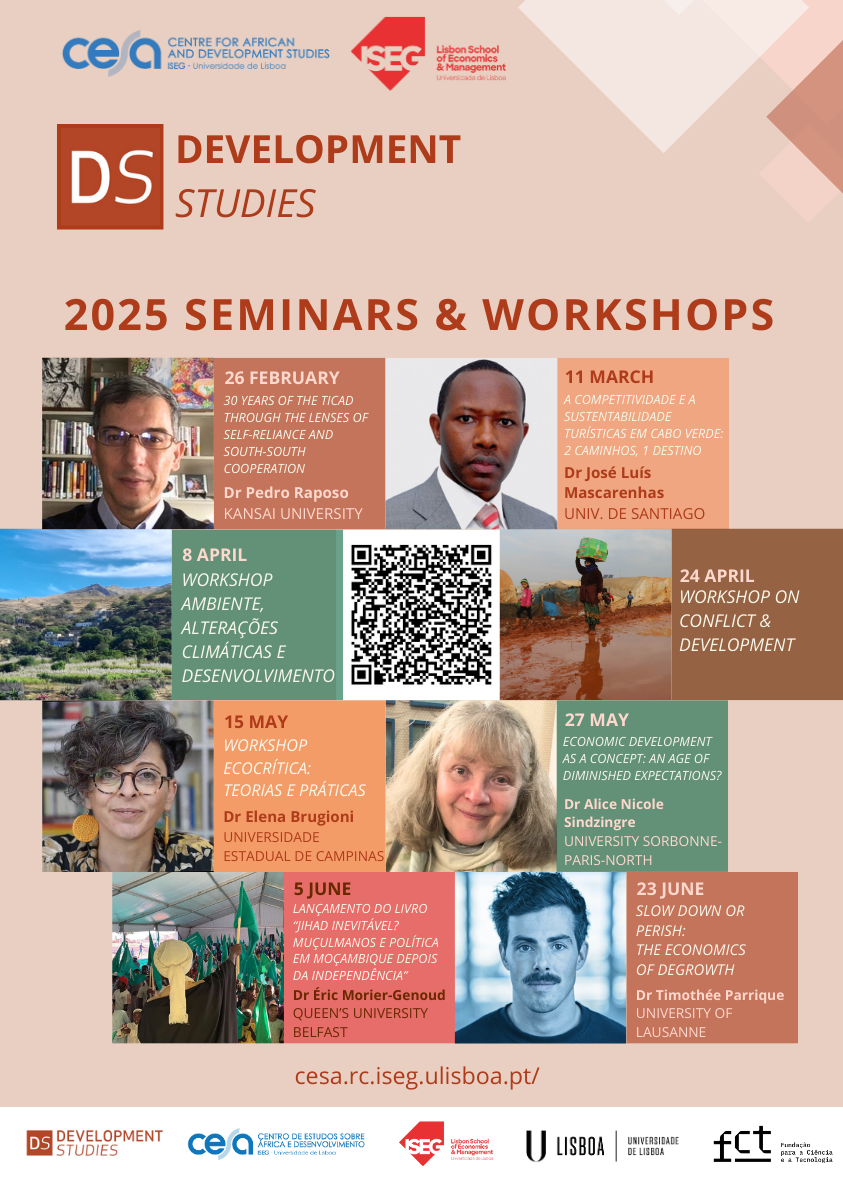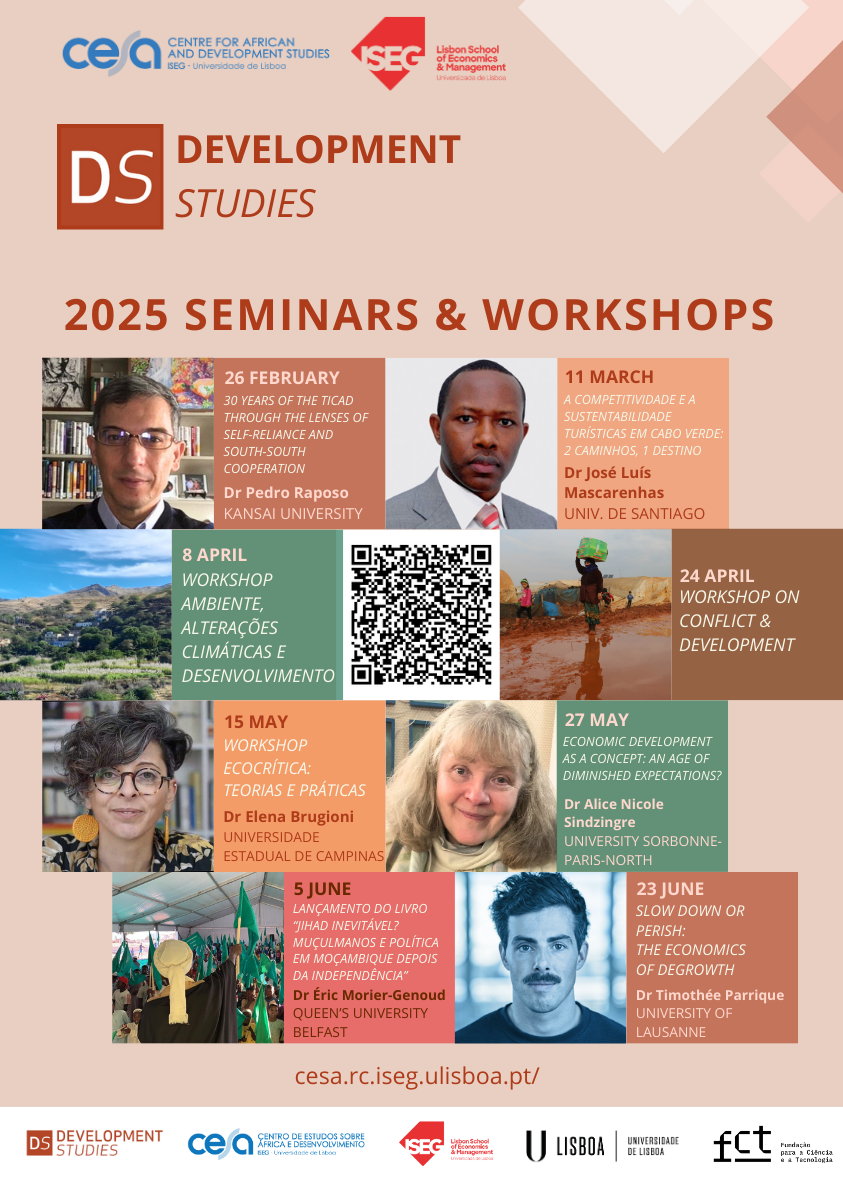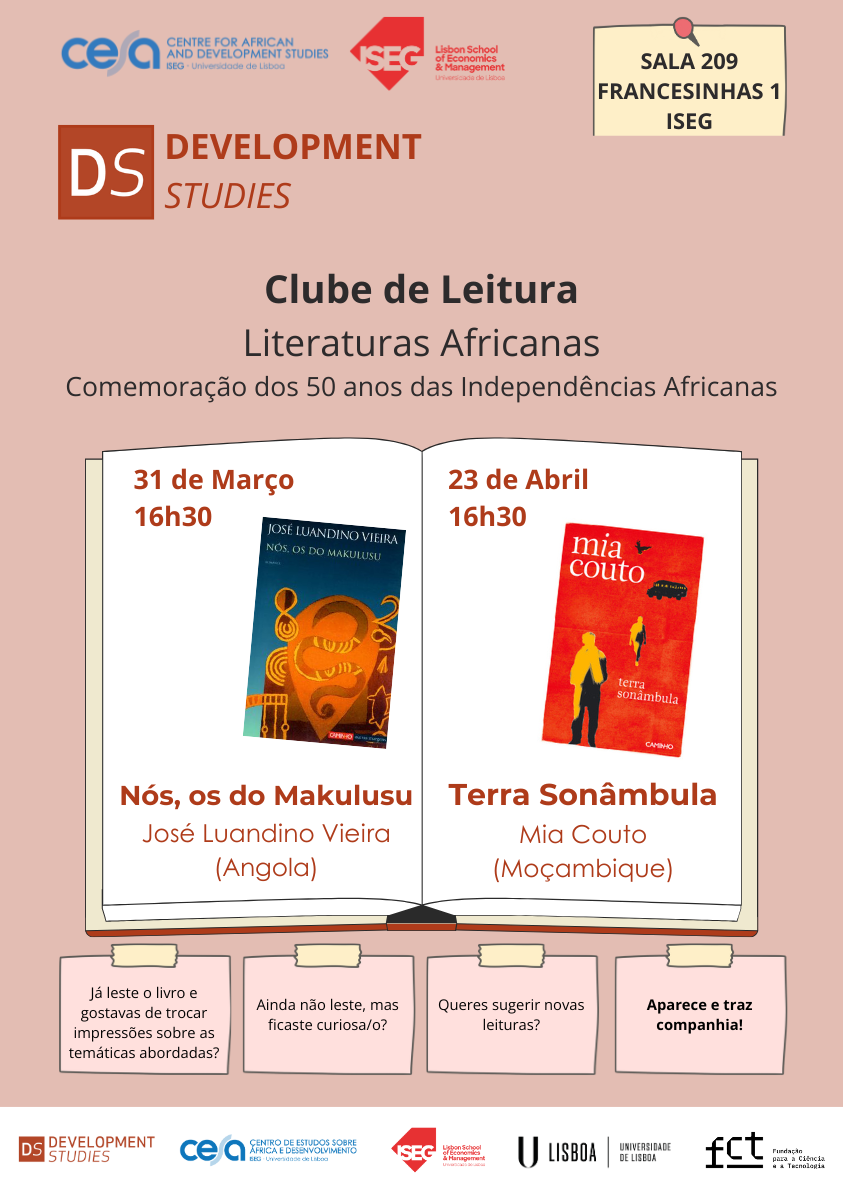CESA

Development Studies Workshops 2025 | Ambiente, Alterações Climáticas e Desenvolvimento
The Development Studies Seminars are an initiative that, since 1991, promotes research carried out in the areas of study of the Masters in Development and International Cooperation (MCDI) of ISEG and the PhD Programme in Development Studies of the University of Lisbon
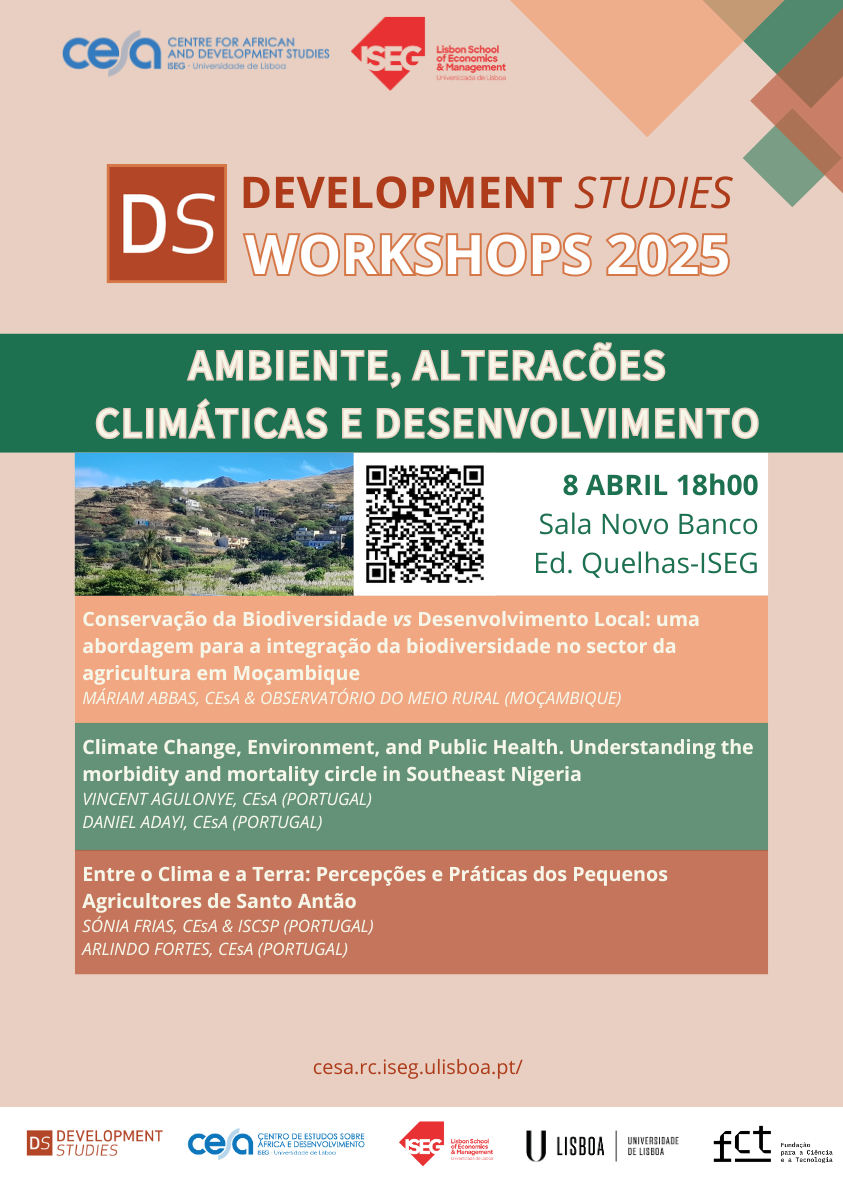
Development Studies Workshops 2025 – Ambiente, Alterações Climáticas e Desenvolvimento
Date: 8 April 2025 (Tuesday)
Time: 6 p.m.
Venue: Novo Banco Room, Quelhas Building – ISEG (Ed. Quelhas, 4th Floor, Rua do Quelhas 6, 1200-781, Lisbon, Portugal)
Presentation #1: Conservação da Biodiversidade vs Desenvolvimento Local: uma abordagem para a integração da biodiversidade no sector da agricultura em Moçambique (speaker: Máriam Abbas, CEsA and Observatório do Meio Rural, Mozambique)
Presentation #2: Entre Clima e a Terra: Percepções e práticas dos pequenos agricultores de Santo Antão (speakers: Sónia Frias, CEsA & ISCSP, and Arlindo Fortes, CEsA)
Presentation #3: Desenvolvimento e Alterações Climáticas: Quadro de ação para políticas coerentes (speaker: Daniela Lopes, FEC)
Presentation #4: Climate Change, Environment, and Public Health. Understanding the morbidity and mortality circle in Southeast Nigeria (speakers: Vincent Agulonye, CEsA, and Daniel Adayi, CEsA)
Free admission, in person event
About the speakers
 Máriam Abbas holds a PhD in Development Studies from the Instituto Superior de Agronomia, Universidade de Lisboa, Portugal. She is a Board Member and researcher at the Observatório do Meio Rural (OMR) in Maputo, Mozambique, where she coordinates the research line “Environment and Rural Areas.” Her main areas of interest include food security, food sovereignty, production systems, climate change, rural development, and agrarian policies.
Máriam Abbas holds a PhD in Development Studies from the Instituto Superior de Agronomia, Universidade de Lisboa, Portugal. She is a Board Member and researcher at the Observatório do Meio Rural (OMR) in Maputo, Mozambique, where she coordinates the research line “Environment and Rural Areas.” Her main areas of interest include food security, food sovereignty, production systems, climate change, rural development, and agrarian policies.

Vincent Agulonye is a researcher at CEsA. He holds a PhD in Development Studies from ISEG, Universidade de Lisboa. His current research focuses on development trends in Nigeria’s private sector, particularly in the manufacturing industry in Anambra.
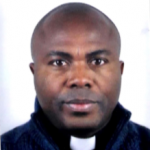
Daniel Adayi is a Catholic missionary priest and researcher at CEsA. He obtained his PhD in Development Studies from ISEG, Universidade de Lisboa, in 2019. His current research explores the interaction of institutions in food and water resource management in emerging economies. Adayi lives in London and serves as the parish priest of Saint Michael and Martin Church in Hounslow.
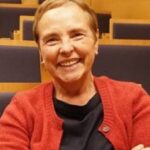 Sónia Frias holds a PhD in Social Sciences – specialising in Anthropology – from the Instituto Superior de Ciências Sociais e Políticas (ISCSP), UTL. She is a tenured Assistant Professor at ISCSP/ULisboa and a researcher at CEsA. She also serves as the President of the African Commission of the Lisbon Geographical Society.
Sónia Frias holds a PhD in Social Sciences – specialising in Anthropology – from the Instituto Superior de Ciências Sociais e Políticas (ISCSP), UTL. She is a tenured Assistant Professor at ISCSP/ULisboa and a researcher at CEsA. She also serves as the President of the African Commission of the Lisbon Geographical Society.

Arlindo Fortes is a PhD candidate in Development Studies at ISEG. He is an Assistant Professor at the University of Cape Verde, where he has served as a board member and coordinator of undergraduate programmes at the School of Agricultural and Environmental Sciences. His research focuses on political economy, agrarian economy, agrarian change and rural transformation, agrarian and rural development, public policies, and food security.
Download the full programme below
Read more:
Author: CEsA Communication (comunicacao@cesa.iseg.ulisboa.pt)
Images: CEsA/Reproduction

Development Studies Seminars to kick off on 26 February with a series of presentations, workshops, a book launch and international scholars
The Centre for African and Development Studies (CEsA/ISEG RESEARCH/ISEG/Universidade de Lisboa), in collaboration with the coordination of the Masters in Development and International Cooperation (MDCI/ISEG) and the PhD in Development Studies (PDED/Universidade de Lisboa), invites you to the Development Studies Seminars 2025 — a series of eight sessions featuring four seminars, four workshops, and a book launch, delivered by international scholars. These sessions aim to foster reflection on various topics within the field of Development Studies. Since 1991, the DS Seminars have been promoting research conducted in the areas covered by the MDCI and PDED programmes.
The sessions will be held with free admission at ISEG (Rua do Quelhas 6, Anfiteatro 23, Francesinhas 1, 1200-781, Lisbon, Portugal), from 26 February to 23 June 2025.
Details on the dates, times, venues, topics, and presenters can be found below:
26 February, 6 p.m. – 8 p.m., Auditorium 3-Quelhas Building, ISEG
Theme: 30 Years of the Tokyo International Conference on African Development Through the Lenses of Self-Reliance and South-South Cooperation
Presenter: Dr Pedro Raposo (CEsA and Kansai University, Japan)
11 March, 8 p.m. – 10 p.m., Room 006-Francesinhas 1 Building, ISEG
Theme: A Competitividade e a Sustentabilidade Turísticas em Cabo Verde: 2 caminhos, 1 destino
Presenter: Dr José Luís Mascarenhas (Universidade de Santiago, Cape Verde)
8 April, 6 p.m. – 9 p.m., Room Novo Banco-Quelhas Building, ISEG
Theme: Workshop on Environment, Climate Change and Development
Presentations: 1. Conservação da Biodiversidade vs Desenvolvimento Local: uma abordagem para a integração da biodiversidade no sector da agricultura em Moçambique (presenter: Máriam Abbas, CEsA and Observatório do Meio Rural, Mozambique); 2. Climate Change, Environment, and Public Health. Understanding the morbidity and mortality circle in Southeast Nigeria (presenters: Vincent Agulonye, CEsA, and Daniel Adayi, CEsA); and 3. Entre Clima e a Terra: Percepções e práticas dos pequenos agricultores de Santo Antão (presenters: Sónia Frias, CEsA and ISCSP, and Arlindo Fortes, CEsA)
24 April, 2 p.m. – 6 p.m., Room Novo Banco-Quelhas Building, ISEG
Theme: Workshop on Conflict and Development
Presentations: 1. The Aid-Security Nexus in Times of Polycrisis: Slashing foreign aid to boost militarism and defense spending (presenter: Marcos Farias Ferreira, CEsA and ISCSP); 2. Reclaiming Agency: Navigating situated dilemmas and building resilience in post-conflict development contexts (presenter: Asif Dawar, National Defence University, Paquistan and CEsA); 3. Moving Beyond Humanitarian Handouts: A study of the Internally Displaced Persons’ (IDPs) farmers’ beans market, Auta Balefi, Nasarawa state, Nigeria (presenter: Cosmas Ba-Ana-Itenebe, CEsA); 4. The Implications of the Conflict in Cabo Delgado Province for the Sustainable Development of Pemba City, Mozambique (presenter: Sílvia Amaral, CEsA); 5. Violence and (Under)Development: The Colombian case (presenter: Fabian Garzón-Cuervo, CEsA); 6. Winning Hearts and Minds Through Dialogue: Experimental evidence from Mozambique’s Islamist insurgency (presenter: Henrique Pita Barros, CEsA).
15 May, 10 a.m. – 6 p.m., Anfitheatre 1-Quelhas Building, ISEG
Theme: Workshop on Ecocritic: theories and practices
Presentations: 1. O Ambientalismo Literário do Pobre. Notas para uma ecocrítica pós-colonial das Literaturas Africanas (presenter: Elena Brugioni, CEsA & UNICAMP, Brazil); 2. Pensar com a Natureza, Perspectivar um Caminho Académico (presenter: Isabel Alves, online, UTAD-CEAUL, Portugal); 3. Pensar as Atmosferas do Antropoceno a partir da Ecopoética (presenter: Nuno Marques, Environmental Humanities Laboratory, KTH Royal Institute of Technology, Sweden), 4. Projeto ECO: Vida mais-que-humana na cultura humana – uma perspectiva amazónica (presenter: Patricia Vieira, CES-UC, Portugal); 5. Das Máquinas no Jardim: Imaginar o Fim do Mundo (presenter: José Duarte, Universidade de Lisboa-CEAUL, Portugal); 6. Ecocrítica do Crescimento Económico (presenter: Carlos Manuel Antunes, Faculdade de Ciência-UL, Portugal); 7. Navegar nas Humanidades e Derivas Azuis dos Estudos de Língua Inglesa (presenter: Margarida Vale de Gato, Universidade de Lisboa-CEAUL, Portugal); 8. Poesia Entoada e Chamanismo, uma Reaproximação entre Chamamentos (presenter: Maurício Vieira, poet, Brazil); 9. A Hidroficção em Perspetiva: Leitura ecocrítica de A Arca de Não é, de Bento Baloi (presenter: João Fernando André, FLUL/HUMA/Alliance Frainçaise, Portugal); 10. Resistência e utopia, do corpo ao território: cruzamentos entre arte, ecologia, educação e ativismo (presenter: Rebecca Mateus, Associação Dunas Livres, Orchidaceae collective, Coletivo HortaFCUL, Portugal)
Organisers: Jessica Falconi (CEsA and FLUL) and Ana Mafalda Leite (CEsA and FLUL)
27 May, 6 p.m. – 8 p.m., Room Novo Banco-Quelhas Building, ISEG
Theme: Economic Development as a Concept: An age of diminished expectations?
Presenter: Alice Nicole Sindzingre (CEsA and Paris-North Economics Centre, University Sorbonne-Paris-North, France)
5 June, 6 p.m. – 8 p.m., Room Novo Banco-Quelhas Building, ISEG
Theme: Diálogo sobre o Islão e Política em Moçambique
Book launch: Jihad Inevitável? Muçulmanos e Política em Moçambique depois da Independência (Tempos e Espaços Africanos), with a seminar held by the author Éric Morier-Genoud (Queen’s University Belfast, UK) and a presentation by Dr Sandra Araújo (ICS)
23 June, 6 p.m. – 8 p.m., Anfitheatre 24-Francesinhas 1 Building, ISEG
Theme: Slow Down or Perish: The Economics of Degrowth
Presenter: Dr Thimothée Parrique (Faculty of Business and Economics, University of Lausanne, Switzerland)
Discussants: Dr Susana Peralta (Nova-SBE), Dr Irina Castro (CES, Universidade de Coimbra), and Dr Alexandre Abreu (CEsA and ISEG)
Read more:
Development Studies Workshops 2025 | Ambiente, Alterações Climáticas e Desenvolvimento
Author: CEsA Communication (comunicacao@cesa.iseg.ulisboa.pt)
Images: CEsA/Reproduction
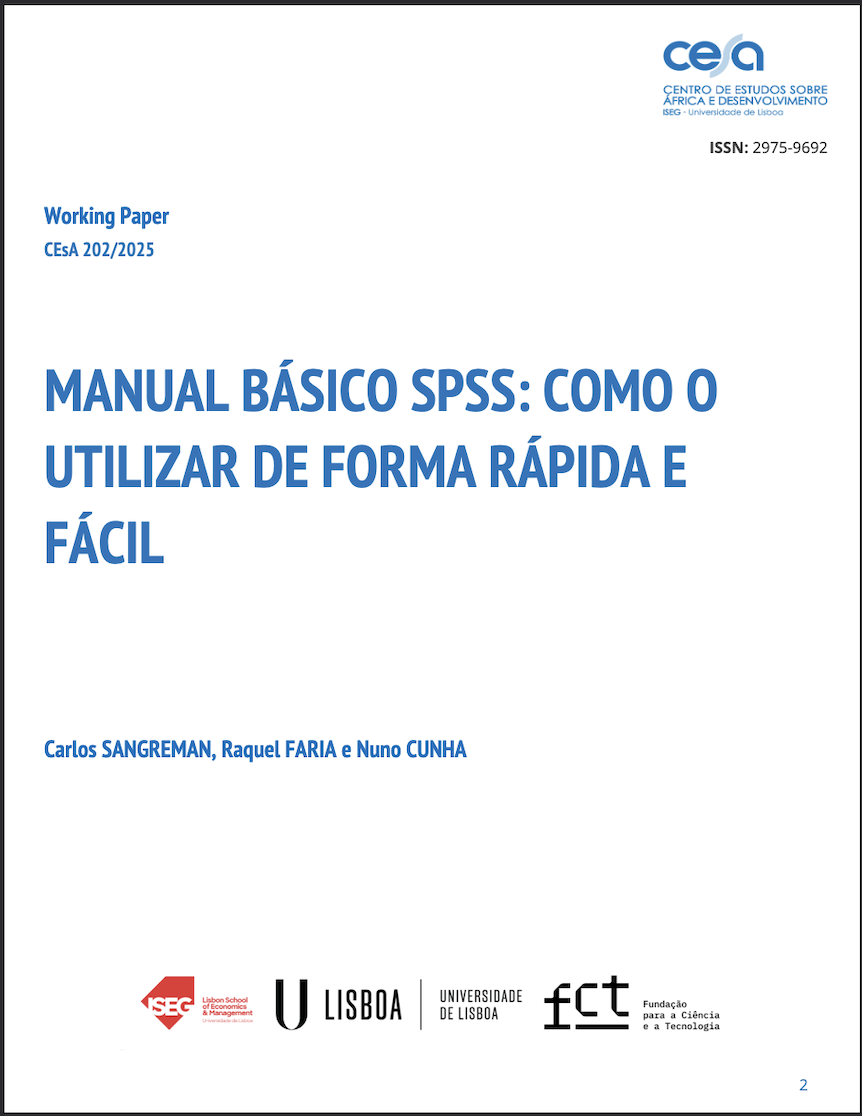
Working Paper 202/2025: Manual básico SPSS: como o utilizar de forma rápida e fácil
Abstract:
This manual aims to explain a quick and effective way to use IBM SPSS Statistics for data entry, management and analysis. In other words, the way in which data can be approached in the field of social sciences using descriptive statistics, demystifying its use.
Cite this Paper:
Sangreman, Carlos; Raquel Faria e Nuno Cunha .(2025). “Manual básico SPSS: como o utilizar de forma rápida e fácil”. CEsA/CSG – Documentos de trabalho nº 202/2025
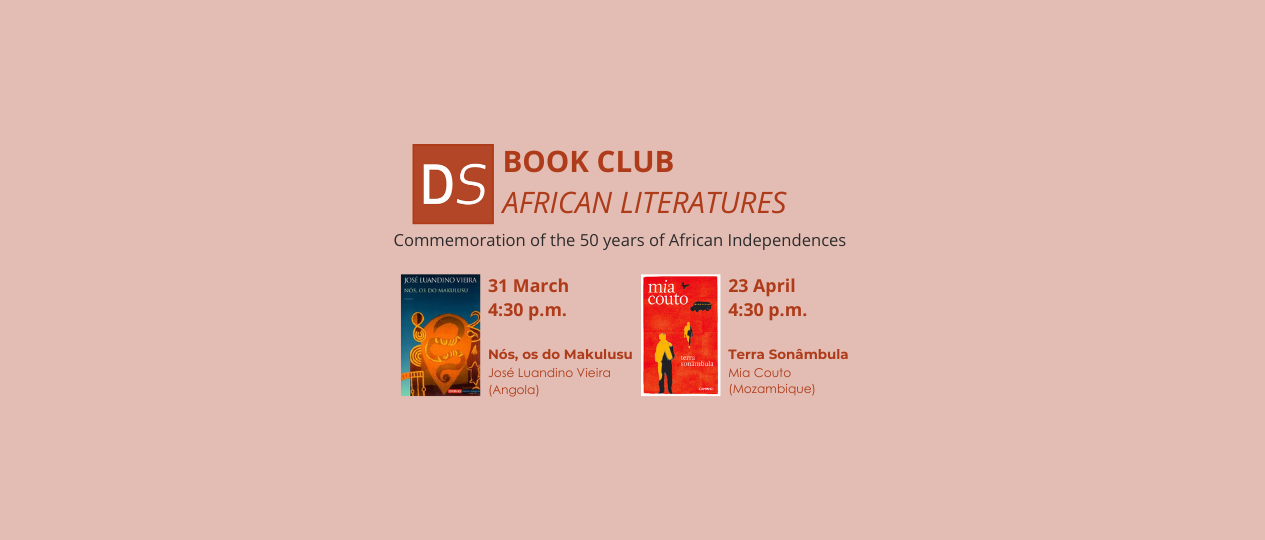
Development Studies Book Club on African Literatures celebrates 50 years of African Independences
The CEsA – Centre for African and Development Studies (ISEG Research) will launch its first book club in March 2025, under the Development Studies theme and coordinated by Susana Brissos, assistant Professor at ISEG – University of Lisbon.
The Development Studies Book Club on African Literatures was created to mark 50 years of African Independences, beginning with the reading of Nós, os do Makulusu by Angolan author José Luandino Vieira and Terra Sonâmbula by Mozambican author Mia Couto – two of the most prominent contemporary Portuguese-language writers.
The inaugural sessions will take place on 31 March and 23 April, always at 4:30 p.m., in Room 209, Francesinhas 1 Building – ISEG (Entrance via Rua das Francesinhas, 1200-731 Lisbon, Portugal). Participation is free, and discussions will be held in Portuguese.
Development Studies Reading Club on African Literatures
31 March 2025, 4:30 p.m., Room 209 – Francesinhas 1, ISEG: Nós, os do Makulusu (José Luandino Vieira, Angola)
23 April 2025, 4:30 p.m., Room 209 – Francesinhas 1, ISEG: Terra Sonâmbula (Mia Couto, Mozambique)
Synopsis of the book Nós, os do Makulusu (José Luandino Vieira, Angola)
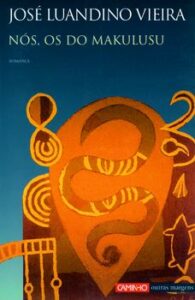
Written in 1967 in the Tarrafal concentration camp (renamed Chão Bom Labour Camp) in just one week — “in one single breath,” as the author himself described it — Nós, os do Makulusu remains José Luandino Vieira’s most complex work in its construction of a literary language rooted in the popular speech of Luanda and the interplay between Portuguese and Kimbundu. This complexity is further deepened by the way the narrative, alongside the ever-present flow of the past— a hallmark of all his works—also brings the future into the story, in a clearly prospective form.
A narrative whose subject, questioning himself to the very last line, ultimately reflects an entire generation facing the historical necessity of a war of liberation — both individual and collective — a generation tasked with questioning the past and imagining the future. Concluding with an open-ended interrogation of that future, the novel remains more relevant today than at the time of its writing. The answer to its final question is still unresolved.
Synopsis of the book Terra Sonâmbula (Mia Couto, Moçambique)

The first novel by Mozambican writer Mia Couto, already well known and appreciated by Portuguese readers, Terra Sonâmbula is set against the backdrop of Mozambique’s war, painting a harsh and brutal portrait of its realities. Within this nightmarish landscape, deeply human characters move — some imbued with magical and mythical dimensions — all wandering across a devastated land, caught between profound despair and an unyielding hope.
Terra Sonâmbula is an extraordinary novel, undoubtedly one of the finest literary works written in Portuguese in recent years. It was recognised as one of the greatest African books of the 20th century.
About the Development Studies Book Club
The project aims to create an open and creative space for dialogue among those interested in exploring, deepening their knowledge, and discussing perspectives on African Literatures. The idea is to focus on literature produced in Portuguese within the CPLP countries, with the possibility of eventually expanding to other African and Latin American authors.
The club is coordinated by researcher Susana Brissos (CEsA/ISEG RESEARCH/ISEG/University of Lisbon) and supported by CEsA (ISEG RESEARCH/ISEG/University of Lisbon).
Author: CEsA Communication (comunicacao@cesa.iseg.ulisboa.pt)
Images: CEsA/Reproduction
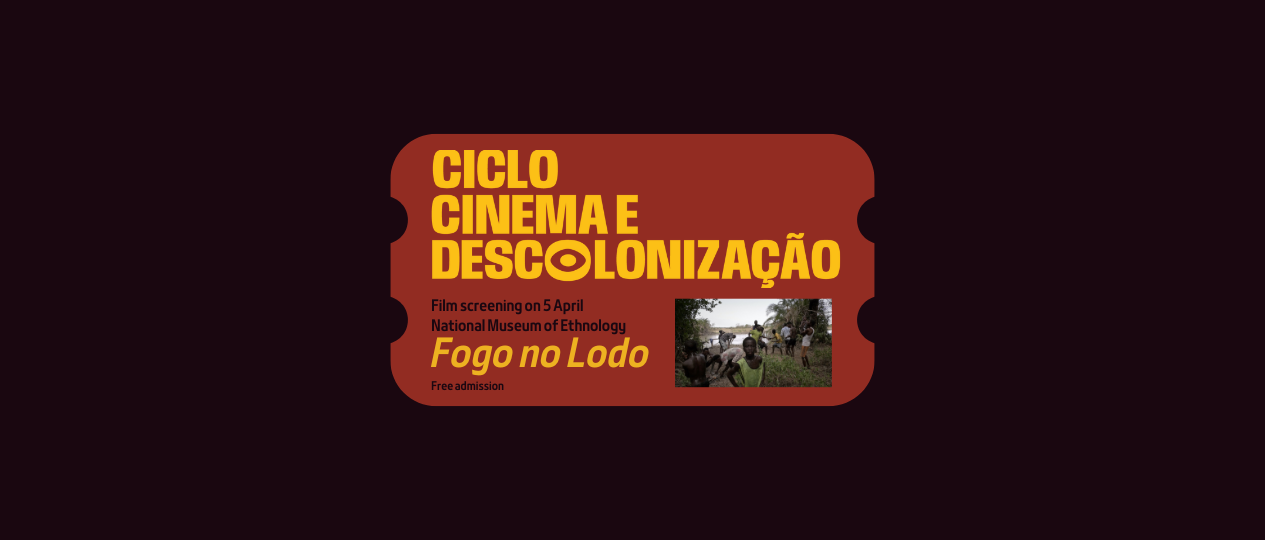
April session of the Cinema and Decolonisation Cycle to screen the documentary ‘Fogo no Lodo’ at the National Museum of Ethnology with free admission
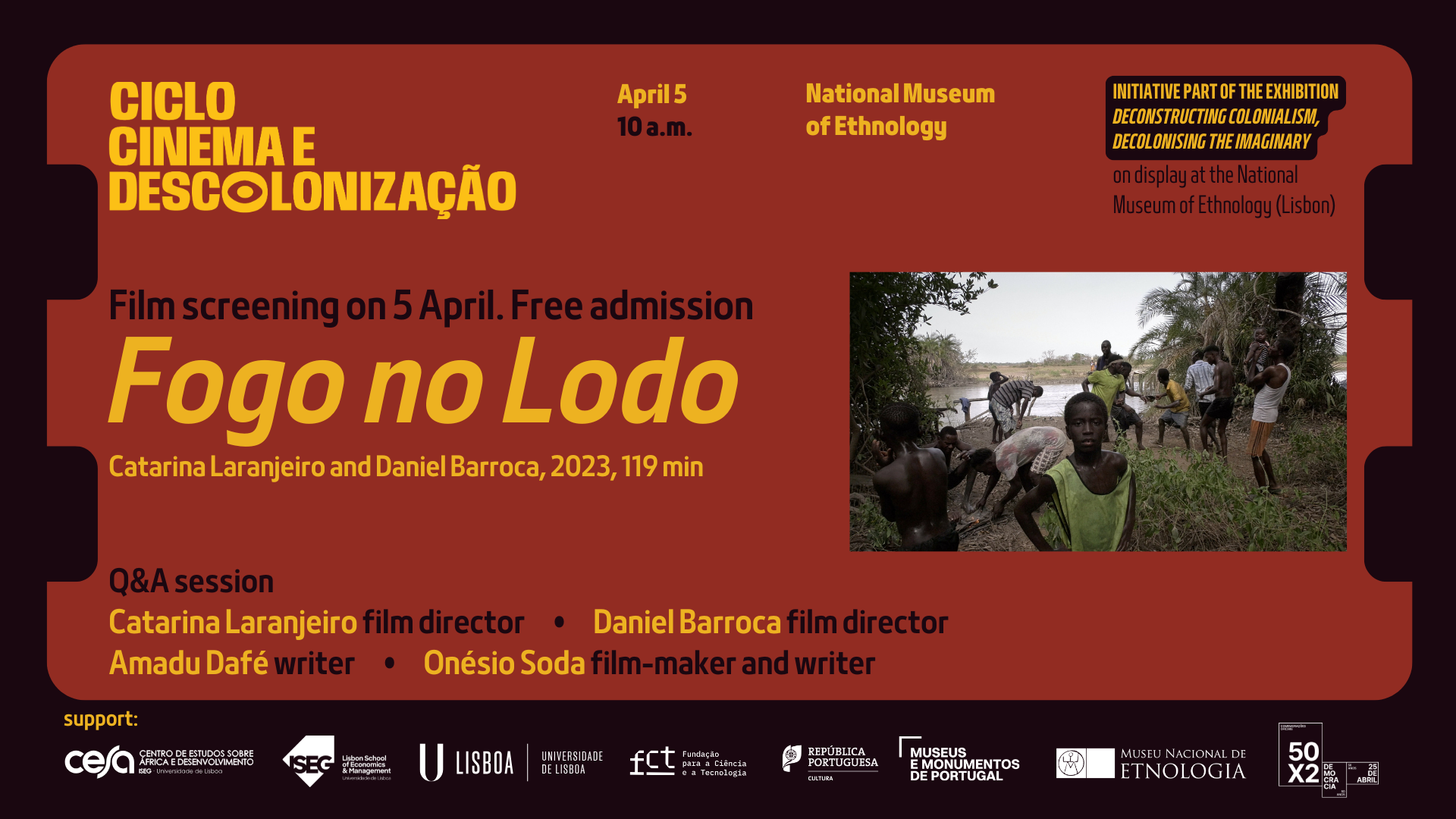
The 2024/2025 season of the Cinema and Decolonisation Cycle has been running since November 2024, hosting cineclub-style sessions to explore the legacies and memories of decolonisation. The next session, scheduled for 5 April, will feature a screening of the documentary Fogo no Lodo (“Fire in the Mud”, Catarina Laranjeiro and Daniel Barroca, 2023, Portugal, 119 min), which has received in 2023 the Fundação INATEL Award at the Doclisboa – International Film Festival and in 2024 the Special Jury Award at the Apricot Tree Film Festival — wich is an international festival dedicated to etnographic documentaries, held in Armenia.
The film will be shown at 10:00 a.m. in the Auditorium of the National Museum of Ethnology (Avenida Ilha da Madeira Lisbon 1400-204), with free admission and subtitles in Portuguese. Following the film screening, a Q&A session will take place with the participation of the film directors, Catarina Laranjeiro and Daniel Barroca, as well as invited guests, namely the Guinean writer Amadu Dafé and the Guinean filmmaker and writer Onésio Soda.
Synopsis – Fogo no Lodo (“Fire in the Mud”, Catarina Laranjeiro and Daniel Barroca, 2023, Portugal, 119 min)
Unal is a village of rice producers whose inhabitants played a crucial role in Guinea-Bissau’s liberation struggle against Portuguese colonialism. They were the first to engage in the armed uprising, mobilizing their ancestral spirits, the Irãs – the natural land-owners to whom they pay reverence – into the guerilla. Still today, every gesture of the rice cycle – from plowing to harvesting – is haunted by memories of the war. A trauma that is also inscribed in their present day rituals, bodies, landscapes, and techno music.
In the war’s aftermath, a group of soldiers got possessed by a messianic vision, “The Shadow”, that gave them the power to foresee the future and heal their communities with bush plants through
talismanic writings. “Fire in the Mud” takes a deeply immersive approach to a complex melting pot of religious forms and political turmoil within a diverse community claiming their future in contemporary Guinea-Bissau.
Credits
Directed by: Catarina Laranjeiro and Daniel Barroca
Assistant Directors: Mamassaliu Na M’Baatcha (Sada) and Julio Na M’Baatcha
Image and editing: Daniel Barroca
Sound engineer, sound designer and sound mixer: Dídio Pestana
Color grading: Gonçalo Ferreira
Graphic Design: Rui Silva
Executive Producer: Catarina Laranjeiro
Producers: Rui Ribeiro, Elsa Sertório and Ansgar Schaefer
Production Manager at Guinea-Bissau: Queba Quebi
Awards
[2023] Prémio Fundação INATEL, DocLisboa – Festival Internacional de Cinema
[2024] Special Jury Award, Apricot Tree Film Festival
Check out the Film Sheet
Get to know the discussants:
 Catarina Laranjeiro is a researcher at the Institute of Contemporary History at NOVA FCSH, where she develops research on vernacular cinema in Cape Verde and Guinea-Bissau and their respective diasporas in Portugal and France. She holds a PhD in Post-Colonialism and Global Citizenship from the Centre for Social Studies at the University of Coimbra and an MA in Visual and Media Anthropology from the Freie Universitaet Berlin. She regularly participates in various projects and collectives that cross anthropology, photography and cinema. She directed the film Pabia di Aos (2013) and co-directed, with Daniel Barroca, the film Fogo no Lodo (2022).
Catarina Laranjeiro is a researcher at the Institute of Contemporary History at NOVA FCSH, where she develops research on vernacular cinema in Cape Verde and Guinea-Bissau and their respective diasporas in Portugal and France. She holds a PhD in Post-Colonialism and Global Citizenship from the Centre for Social Studies at the University of Coimbra and an MA in Visual and Media Anthropology from the Freie Universitaet Berlin. She regularly participates in various projects and collectives that cross anthropology, photography and cinema. She directed the film Pabia di Aos (2013) and co-directed, with Daniel Barroca, the film Fogo no Lodo (2022).
 Daniel Barroca is a visual artist working with audiovisual and interdisciplinary formats. He has undertaken residencies at the Spanish Academy in Rome (2003–2004), Künstlerhaus Bethanien in Berlin (2007), QBox Gallery in Athens (2009), Rijksakademie van Beeldende Kunsten in Amsterdam (2010–2011), Home Workspace Programme at Ashkal Alwan in Beirut (2013–2014), and Open Sessions at The Drawing Center in New York (2014–2015). His work includes expanded cinema installations, which have been exhibited in various national and international venues over the years. In 2018, he completed a master’s degree in Anthropology at the University of Florida, Gainesville, as part of his broader research on the creation of immaterial images during the Colonial War. He is currently pursuing a PhD in Anthropology at the Institute of Social Sciences, University of Lisbon (ICS).
Daniel Barroca is a visual artist working with audiovisual and interdisciplinary formats. He has undertaken residencies at the Spanish Academy in Rome (2003–2004), Künstlerhaus Bethanien in Berlin (2007), QBox Gallery in Athens (2009), Rijksakademie van Beeldende Kunsten in Amsterdam (2010–2011), Home Workspace Programme at Ashkal Alwan in Beirut (2013–2014), and Open Sessions at The Drawing Center in New York (2014–2015). His work includes expanded cinema installations, which have been exhibited in various national and international venues over the years. In 2018, he completed a master’s degree in Anthropology at the University of Florida, Gainesville, as part of his broader research on the creation of immaterial images during the Colonial War. He is currently pursuing a PhD in Anthropology at the Institute of Social Sciences, University of Lisbon (ICS).
 Amadu Dafé was born in Ingoré, Guinea-Bissau, and has been living in Portugal for over twelve years, where he studied Law and Public Employment Law at the Faculty of Law, University of Lisbon. He also holds a degree in Accounting from the National School of Administration in Guinea-Bissau. He is the presenter of Mar de Letras, one of the longest-running and most prestigious programmes on RTP’s Africa channel. He is a co-founder of the Casa da Cultura da Guiné-Bissau in Lisbon and a full member of both the Association of Writers of Guinea-Bissau and PEN Guinea-Bissau. In 2021, he edited and organised the reissue of Florbela Espanca – Alma Sonhadora Irmã Gémea de Fernando Pessoa, published by Manufactura Editora, which won Bertrand’s 2021 Book of the Year Award in the reissue category. He is the author of several works, including A Selva Mágica das Sarnadas de Ródão (2023, Editorial Novembro), A Cidade que Tudo Devorou (2022, Nimba Edições), Jasmim (2020, Manufactura Editora, translated into German), Ussu de Bissau (2019, Manufactura Editora, finalist for the 2021 Eça de Queiroz and BCP Literary Prize), and Magarias (2017, Esfera do Caos–Editores). He co-authored Fora de Jogo (2019), a short story collection commemorating the 25th anniversary of KuSiMon Publishing, which was translated into Spanish. Among other distinctions, he has twice won the José Carlos Schwarz Literary Prize (2015 and 2017) and the Matilde Rosa Araújo International Children’s Story Prize (2012).
Amadu Dafé was born in Ingoré, Guinea-Bissau, and has been living in Portugal for over twelve years, where he studied Law and Public Employment Law at the Faculty of Law, University of Lisbon. He also holds a degree in Accounting from the National School of Administration in Guinea-Bissau. He is the presenter of Mar de Letras, one of the longest-running and most prestigious programmes on RTP’s Africa channel. He is a co-founder of the Casa da Cultura da Guiné-Bissau in Lisbon and a full member of both the Association of Writers of Guinea-Bissau and PEN Guinea-Bissau. In 2021, he edited and organised the reissue of Florbela Espanca – Alma Sonhadora Irmã Gémea de Fernando Pessoa, published by Manufactura Editora, which won Bertrand’s 2021 Book of the Year Award in the reissue category. He is the author of several works, including A Selva Mágica das Sarnadas de Ródão (2023, Editorial Novembro), A Cidade que Tudo Devorou (2022, Nimba Edições), Jasmim (2020, Manufactura Editora, translated into German), Ussu de Bissau (2019, Manufactura Editora, finalist for the 2021 Eça de Queiroz and BCP Literary Prize), and Magarias (2017, Esfera do Caos–Editores). He co-authored Fora de Jogo (2019), a short story collection commemorating the 25th anniversary of KuSiMon Publishing, which was translated into Spanish. Among other distinctions, he has twice won the José Carlos Schwarz Literary Prize (2015 and 2017) and the Matilde Rosa Araújo International Children’s Story Prize (2012).
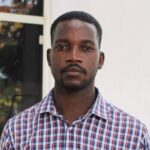 Onésio Soda, pseudonym UNKAFF, is a Guinean filmmaker, writer, sociologist, and military officer, currently a master’s candidate in Development Studies at ISTEC-IUL. He is a co-founder and member of the Kabaz Kultural Association and a member of the Commission for the Collection of Historical Data on the National Liberation Struggle at the General Staff of the Armed Forces of Guinea-Bissau. He is also the mentor of the Nô Ambiente, Nô Mamê project. His works include the short films Vozes de Mar (2019) and Lágrimas de SIDA (2020), the essay A Luta na Guiné: da luta pacífica à luta armada (2020), the article O papel do Museu Militar da Luta de Libertação Nacional na formação da Consciência Histórica Guineense (2021), and the essay A pequena Guiné e a sua grande história (2022).
Onésio Soda, pseudonym UNKAFF, is a Guinean filmmaker, writer, sociologist, and military officer, currently a master’s candidate in Development Studies at ISTEC-IUL. He is a co-founder and member of the Kabaz Kultural Association and a member of the Commission for the Collection of Historical Data on the National Liberation Struggle at the General Staff of the Armed Forces of Guinea-Bissau. He is also the mentor of the Nô Ambiente, Nô Mamê project. His works include the short films Vozes de Mar (2019) and Lágrimas de SIDA (2020), the essay A Luta na Guiné: da luta pacífica à luta armada (2020), the article O papel do Museu Militar da Luta de Libertação Nacional na formação da Consciência Histórica Guineense (2021), and the essay A pequena Guiné e a sua grande história (2022).
About the Cinema and Decolonisation Cycle
The sessions of the Cinema and Decolonisation Cycle will continue until June 2025, with screenings taking place in Auditorium 2 at ISEG (with the exception of the 5 April, which will be held at the National Museum of Ethnology). This initiative runs parallel to the exhibition Deconstructing Colonialism, Decolonising the Imagination, on display at the National Museum of Ethnology until 2 November.
Check out the programme below:
Decolonisation must be understood as an ongoing process, one that needs to be embraced and integrated into social, political, cultural, and personal dynamics. The project aims to create an open, dynamic space for sharing memories, narratives, dialogues, and reflections. It is coordinated by researcher Jessica Falconi (CEsA/ISEG/ULisboa) and curated by researcher and filmmaker Isabel Noronha (CEsA/ISEG/ULisboa) and filmmaker Camilo de Sousa.
Coordination: Jessica Falconi (CEsA/ISEG/ULisboa)
Curation: Isabel Noronha (CEsA/ISEG/ULisboa) and Camilo de Sousa
Scientific Consulting: Isabel Castro Henriques (CEsA/ISEG/ULisboa), Joana Pereira Leite (CEsA/ISEG/ULisboa), and Ana Mafalda Leite (CEsA/ISEG/ULisboa)
Collaboration: Luca Fazzini and João Moreira Silva
Support: CEsA/ISEG/ULisboa
Read more:
Fogo no Lodo (“Fire in the Mud”) – Kintop website
Ciclo de Cinema e Descolonização | Projeção do Filme “Fogo no Lodo” – ISEG website
Fogo no Lodo (“Fire in the Mud”) – Trailer on YouTube
Programme for the 2024/2025 season of the Cinema and Decolonisation Cycle, in parallel with the exhibition ‘Deconstructing Colonialism, Decolonizing the Imagination’
Author: CEsA Communication Team (comunicacao@cesa.iseg.ulisboa.pt)
Image: Reproduction/Kintop

Recording of the DS Seminar “Tourism Competitiveness and Sustainability in Cape Verde: 2 paths, 1 destination” available on CEsA’s YouTube Channel
The Development Studies Seminar “Tourism Competitiveness and Sustainability in Cape Verde: 2 paths, 1 destination” (A Competitividade e a Sustentabilidade Turísticas em Cabo Verde: 2 caminhos, 1 destino, original title, in Portuguese) took place on 11 March, 2025, at 8:00 PM, in Room 006-Francesinhas 1 at ISEG – Lisbon School of Economics and Management. The seminar was presented by Professor José Luís Mascarenhas (University of Santiago, Cape Verde). The session was recorded and is now available on CEsA’s YouTube channel.
This event was part of the Development Studies Seminars, an initiative that, since 1991, has been promoting research in the study areas of the Master’s in Development and International Cooperation (MDCI) at ISEG and the PhD Programme in Development Studies (PDED) at the University of Lisbon.
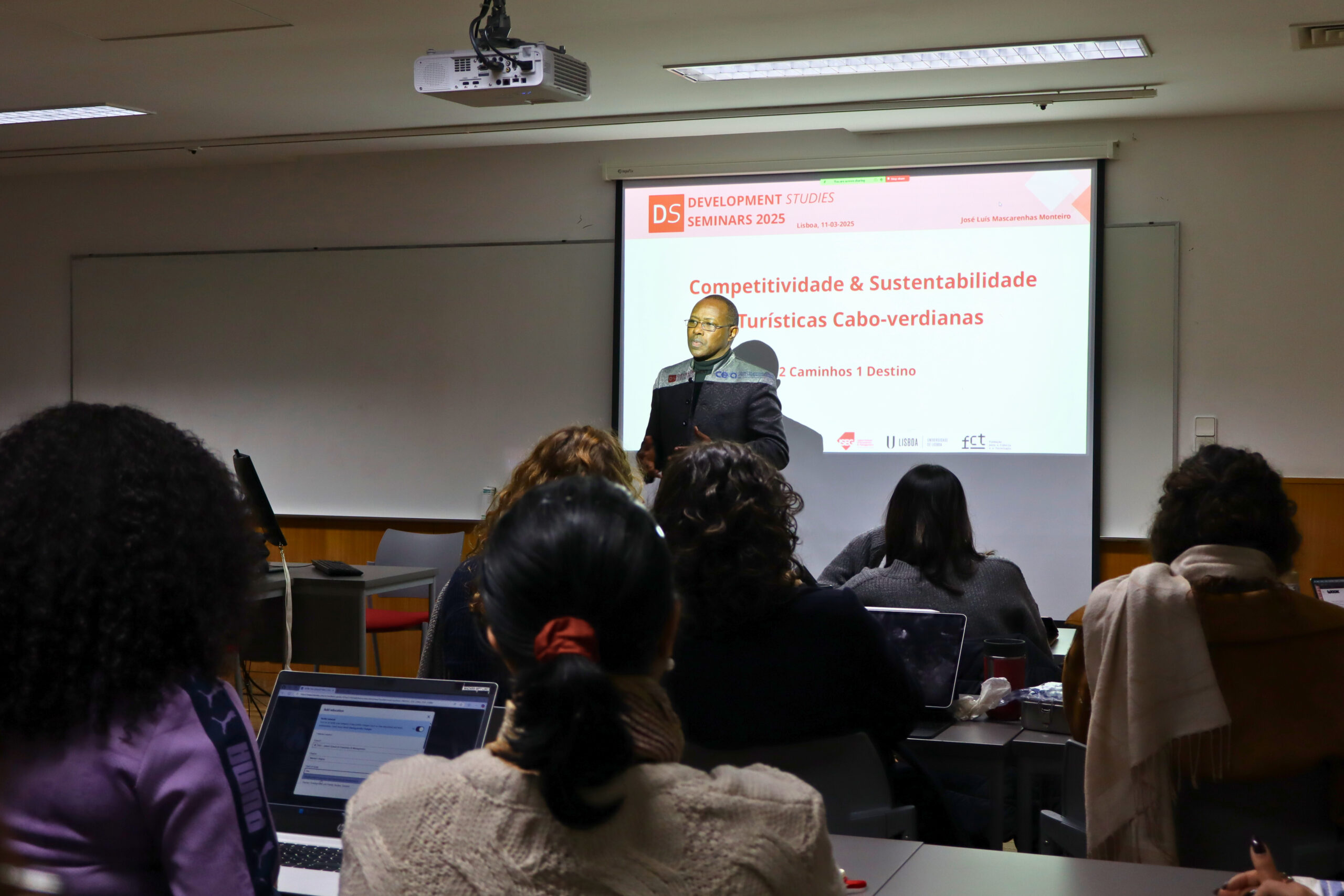
The presentation examined the evolution of tourism in Cape Verde throughout the 21st century and the challenges of balancing competitiveness and sustainability in this sector. The speaker also reflected on new perspectives for the future of tourism, considering the country’s characteristics and development strategy up to 2026.
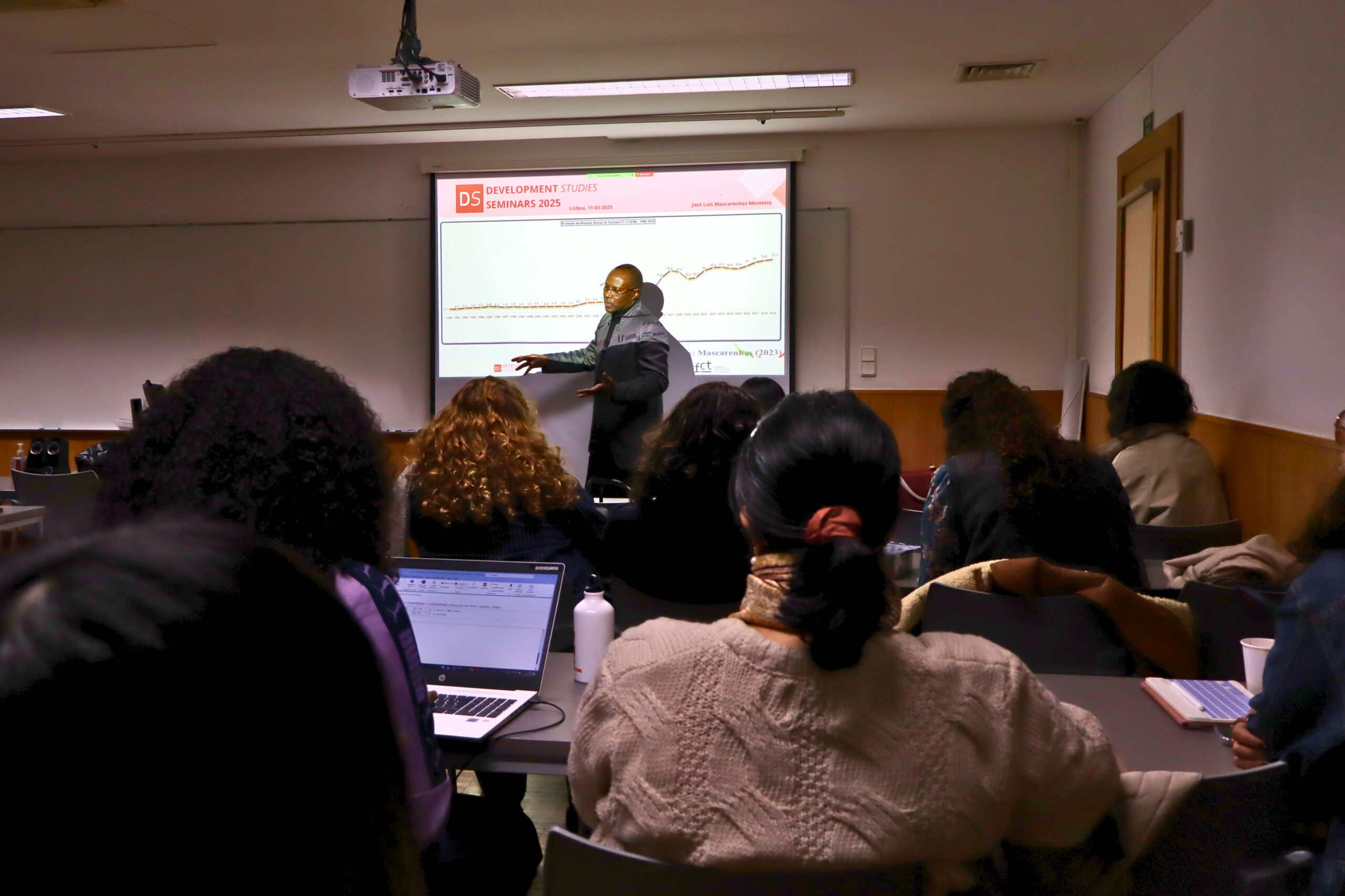
Watch the seminar recording below:
Read more
Development Studies Seminars 2025 | A Competitividade e a Sustentabilidade Turísticas em Cabo Verde: 2 caminhos, 1 destino
A Competitividade e a Sustentabilidade Turísticas em Cabo Verde: 2 caminhos, 1 destino (Recording on YouTube)
Author: CEsA Communication (comunicacao@cesa.iseg.ulisboa.pt)
Images: CEsA/Reproduction
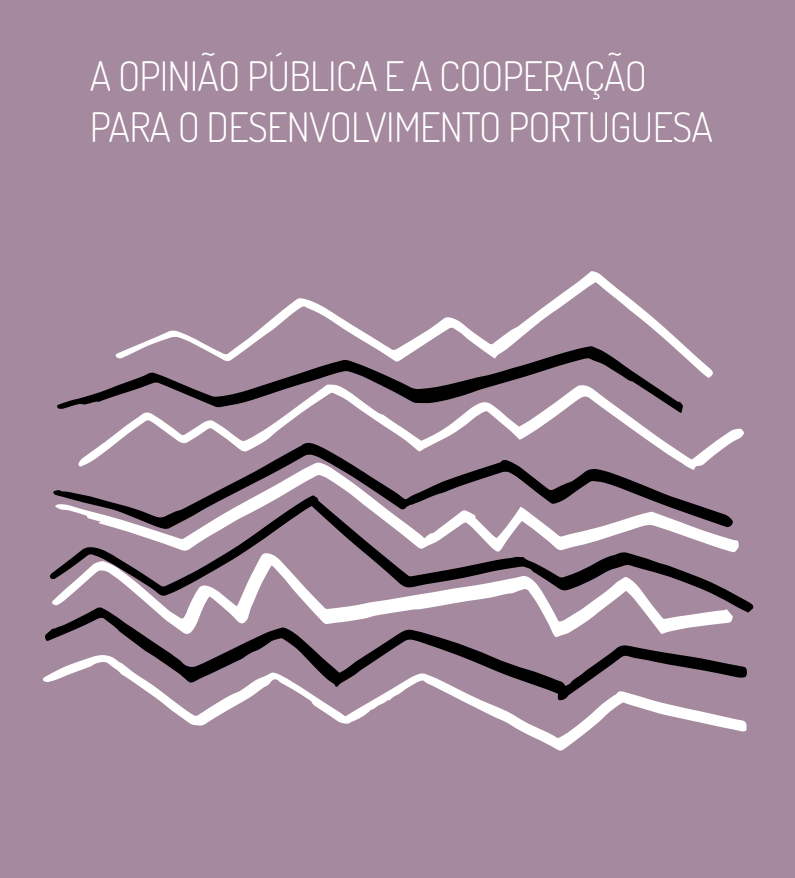
A Opinião Pública e a Cooperação para o Desenvolvimento Portuguesa
Abstract:
Almost 20 years after the first public opinion poll on the role of Development Cooperation, particularly Portuguese Cooperation, we have launched a new study to find out what Portuguese society thinks about this sector, at a time when a new strategic cycle of Portuguese Cooperation is underway. In this sense, the Association for Cooperation Between Peoples (ACEP) proposed to the Centre for African and Development Studies of the Lisbon School of Economics and Management (CEsA/ISEG) and to the Department of Social Sciences and Territorial Policies of the University of Aveiro (DCSPT/UA) a process of updating knowledge about Portuguese public opinion, in order to provide a more reliable view of opinions in this area and better plan strategies for dialogue and public debate with different sectors of society, including national political decision-makers and journalists.
The Portuguese Cooperation Strategy 2030 highlights, among other things, the importance of communication with society and the visibility of the sector to allow for greater understanding and recognition of its role in the calculation of Portuguese public policies. In fact, in Portugal, Development Cooperation continues to occupy a residual space in the political debate, especially at the level of the Assembly of the Republic and the media, and there are still difficulties in approaching and working systematically with Portuguese MPs and journalists and in placing the issues of Development and International Cooperation in the media.
Over the last 20 years, International Development Cooperation has undergone profound changes, which Portuguese Cooperation has not been immune to. Although it is a policy about which there is little institutional debate at national level, it is a crucial sector in the way Portugal relates to the world, particularly with some of the countries with which it maintains strong bilateral relations, such as the PALOP and East Timor. This relationship does not only involve the State, but also involves a wide range of sectors, both public and private, for-profit and non-profit, approaching Development Cooperation in different ways and giving rise to different types of relationships.
This survey did not come about in a vacuum and is naturally not immune to the current international context, which is particularly adverse and poses additional challenges to Development Cooperation. However, this public policy has a unique role in promoting Development, peace and human rights. Current conflicts, in particular the wars in Gaza and Ukraine (which marked the return of war to Europe), the disrespect for and discredit of International Law and multilateralism, as well as the rise of populist discourse throughout the world and, particularly in Europe, are elements that characterise the environment in which Development Cooperation needs to continue to assert itself and strengthen itself as the noblest expression of the foreign policy of States and international institutions.
Cite this book:
ACEP & CEsA (2024). “A Opinião Pública e a Cooperação para o Desenvolvimento Portuguesa”. ISBN 978-989-8625-35-9

Development Studies Seminars 2025 | A Competitividade e a Sustentabilidade Turísticas em Cabo Verde: 2 caminhos, 1 destino
The Development Studies Seminars are an initiative that, since 1991, promotes research carried out in the areas of study of the Masters in Development and International Cooperation (MCDI) of ISEG and the PhD Programme in Development Studies of the University of Lisbon
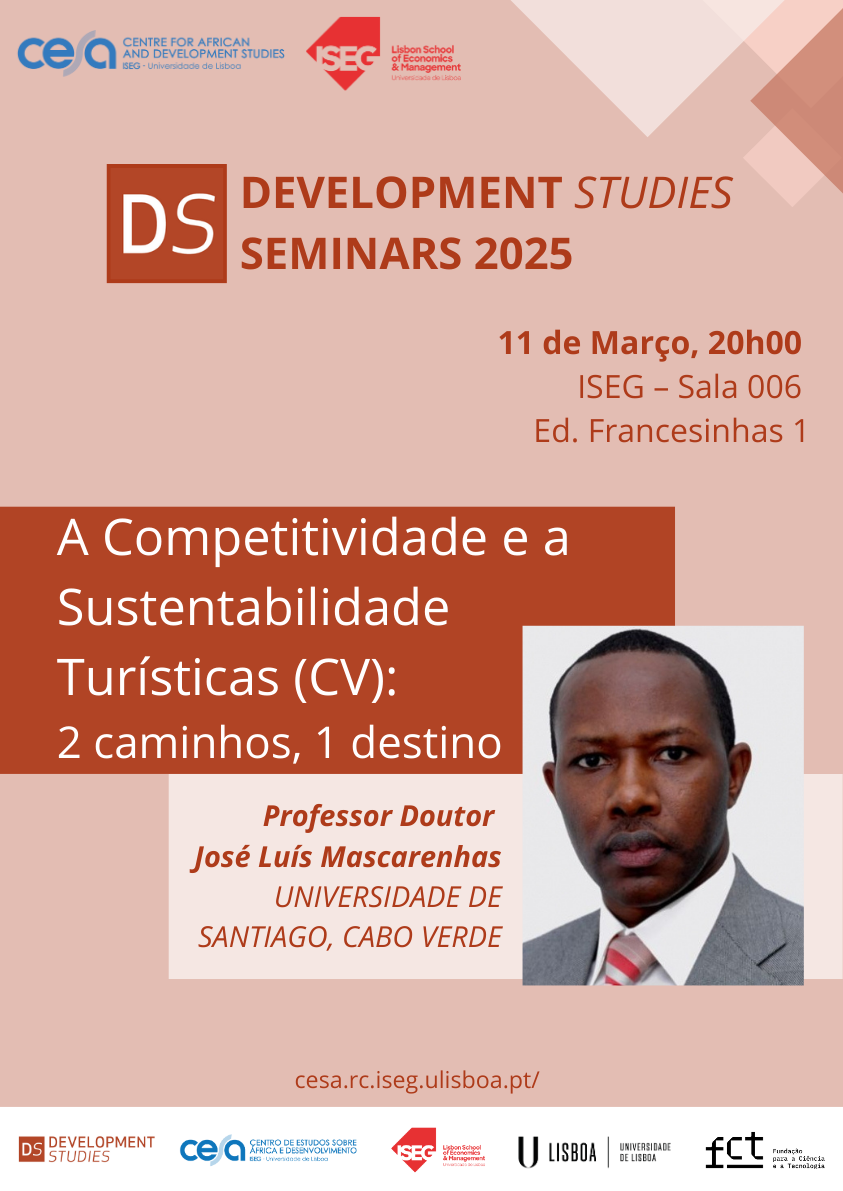
Development Studies Seminars 2025
Topic: A Competitividade e a Sustentabilidade Turísticas em Cabo Verde: 2 caminhos, 1 destino
Presenter: Professor José Luís Mascarenhas (Universidade de Santiago, Cape Verde)
Date: 11 March, 2025 (Tuesday)
Hour: 8 p.m. – 10 p.m.
Venue: Room 006, Francesinhas 1 Building, ISEG (Access by Rua das Francesinhas 1200-731, Lisbon, Portugal)
Free admission, in person event. Lecture in Portuguese.
About José Luís Mascarenhas

José Luís Mascarenhas Monteiro, originally from Santa Catarina on the island of Santiago (Tomba Touro), was born in the city of Praia, where he completed his primary education. He pursued his secondary education in Portugal and obtained a Bachelor’s and a Master’s degree in Development and International Cooperation from ISEG – University of Lisbon. In 2023, he completed his PhD in Development Studies at the same institution.
A Founding Member of the University of Santiago (US), he has held various positions, including Pro-Rector, Secretary-General, Head of Department, and Coordinator of Undergraduate and Master’s programmes. He also served as CEO of SCC (the entity governing US) and President of CEUS – Casa do Empreendedor. Since 2008, he has been a Guest Lecturer at this institution.
Since 2022, José Luís Mascarenhas Monteiro has been a consultant to the Government of Cabo Verde and the World Bank.
Publication related to this session: Tourism competitiveness in Cape Verde : the case of Tarrafal/Santiago
Abstract: The study of competitiveness has been constantly gaining importance in recent decades. Cape Verde Government elected Tarrafal as a development hub of tourism competitiveness. Since the empirical validation of competitiveness Cape Verde is still shortfall, so the current research aims to analyze the determinants of competitive advantage of tourism in Tarrafal. To achieve this goal, it was adopted a qualitative methodology based on a sample of the major key players in the tourism area and the creation of four working groups during Tarrafal Technical Days (1 and 2 July 2022) to better discuss these issues. The discussion of the final conclusions from each working group, allowed to systematize some major development alternatives to Tarrafal as a strategic tourism hub. Major implications for managers were also presented, such as the importance to develop and reinforce cultural traditions, reinforce entrepreneurship in order to maximize the tourism chain value through the implementation of better infrastructures (better roads, a maritime port as well as an aerodrome), diversify the tourist offer based on different segments (culture, nature, sports, events, remote working among others) and benefit other regions and municipalities around the county.
Author: CEsA Communication (comunicacao@cesa.iseg.ulisboa.pt)
Images: CEsA/Reproduction

Development Studies Seminars 2025 | 30 Years of TICAD Through the Lenses of Self-Reliance and South-South Cooperation
The Development Studies Seminars are an initiative that, since 1991, promotes research carried out in the areas of study of the Masters in Development and International Cooperation (MCDI) of ISEG and the PhD Programme in Development Studies of the University of Lisbon
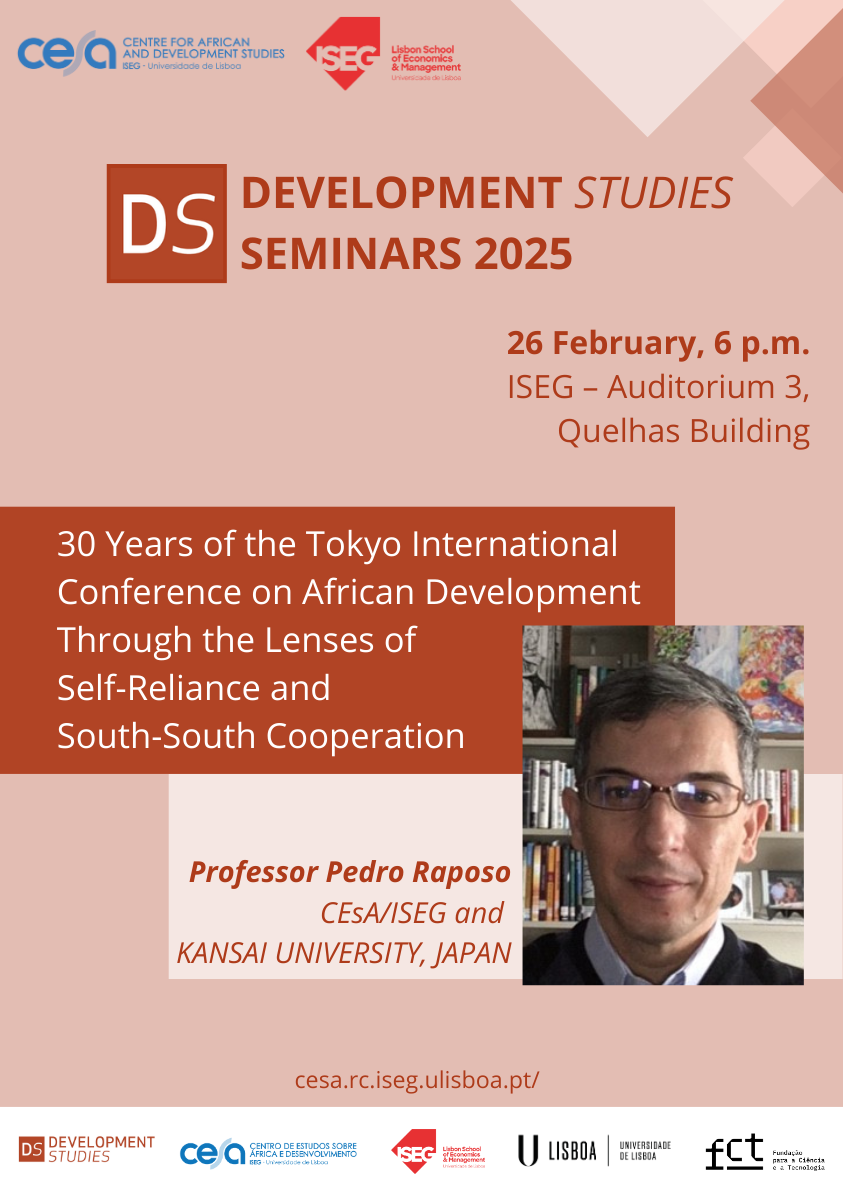
Development Studies Seminars 2025
Topic: 30 Years of the Tokyo International Conference on African Development Through the Lenses of Self-Reliance and South-South Cooperation
Presenter: Professor Pedro Raposo (CEsA and Kansai University, Japan)
Date: 26 February, 2025 (Wednesday)
Hour: 6 p.m. – 9 p.m.
Venue: Auditorium 3, ISEG (Quelhas Building, 2nd Floor, Rua do Quelhas 6, 1200-781, Lisbon, Portugal)
Free admission, in person event
About Pedro Raposo
 Pedro Miguel Amakasu Raposo de Medeiros Carvalho is full Professor of Economic History and African Economic Studies at Kansai University, Osaka since April 1st, 2018. He is PhD in Economics from Okayama University and Policy Studies from Nanzan University, both in Japan. Previously, he has taught Development Economics at Lisbon School of Economics and Management (ISEG/ULisboa) and teamed the PhD coordination in Development Studies (DS) at ISEG/ULisboa jointly lectured with University of Lisbon. He also coordinated the International Relations Course at University Lusíada of Luanda, Angola. He is Co-Founder of the Japan Society for Afrasian Studies (JSAS) established in 2019 and Journal Editor of the same organization. His research line is on international relations, economy, development, and international cooperation with focus on Africa.
Pedro Miguel Amakasu Raposo de Medeiros Carvalho is full Professor of Economic History and African Economic Studies at Kansai University, Osaka since April 1st, 2018. He is PhD in Economics from Okayama University and Policy Studies from Nanzan University, both in Japan. Previously, he has taught Development Economics at Lisbon School of Economics and Management (ISEG/ULisboa) and teamed the PhD coordination in Development Studies (DS) at ISEG/ULisboa jointly lectured with University of Lisbon. He also coordinated the International Relations Course at University Lusíada of Luanda, Angola. He is Co-Founder of the Japan Society for Afrasian Studies (JSAS) established in 2019 and Journal Editor of the same organization. His research line is on international relations, economy, development, and international cooperation with focus on Africa.
Author: CEsA Communication (comunicacao@cesa.iseg.ulisboa.pt)
Images: CEsA/Reproduction
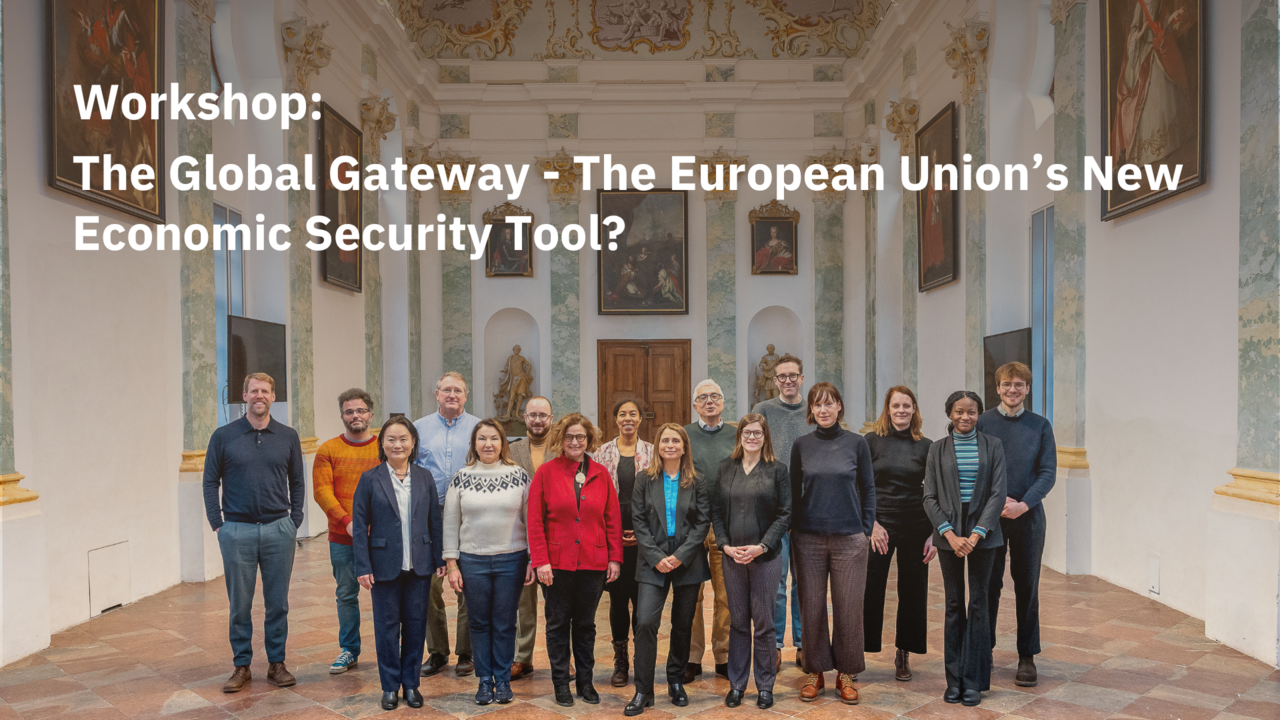
Luís Pais Bernardo presents a seminar at the 2nd Research Workshop on the Global Gateway Initiative at the Technical University of Munich

CEsA researcher, PhD in Sociology, and Political Science specialist Luís Pais Bernardo delivered the seminar Connecting Markets: Business Power and the EU Global Gateway at the 2nd Workshop on the Global Gateway Initiative, held on 13–14 December 2024 at the Technical University of Munich.
Bernardo and a group of scholars specialising in political economy and the European Union gathered to critically examine the political and economic implications of the Global Gateway strategy. This strategy aims to enhance global infrastructure, promote sustainable development, and strengthen the EU’s geopolitical influence.
The workshop summary is available in English on the university’s website: https://www.hfp.tum.de/en/governance/news/article/workshop/
Author: CEsA Communication Team (comunicacao@cesa.iseg.ulisboa.pt)
Image: Astrid Eckert
